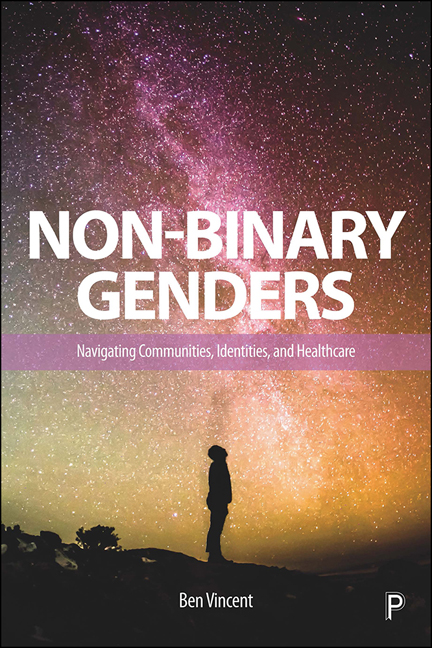Book contents
- Frontmatter
- Dedication
- Contents
- List of Figures and Tables
- Notes on the Author
- Acknowledgements
- Introduction
- 1 Reviewing Non-Binary: Where have we Come From?
- 2 Doing and Being: My Relationship with this Work, and how it was Done
- 3 ‘Not Trans Enough’: The Relationship Between Non-Binary Gender Identities, Uncertainty and Legitimacy
- 4 Non-Binary Times, Non-Binary Places: Communities and their Intersections
- 5 Views of the Clinic: Non-Binary Perceptions and Experiences of General Healthcare Services
- 6 A Strong Motivation to Tick The Boxes: Non-Binary Perceptions and Experiences of Gender Identity Clinics
- Conclusion
- References
- Index
2 - Doing and Being: My Relationship with this Work, and how it was Done
Published online by Cambridge University Press: 10 March 2021
- Frontmatter
- Dedication
- Contents
- List of Figures and Tables
- Notes on the Author
- Acknowledgements
- Introduction
- 1 Reviewing Non-Binary: Where have we Come From?
- 2 Doing and Being: My Relationship with this Work, and how it was Done
- 3 ‘Not Trans Enough’: The Relationship Between Non-Binary Gender Identities, Uncertainty and Legitimacy
- 4 Non-Binary Times, Non-Binary Places: Communities and their Intersections
- 5 Views of the Clinic: Non-Binary Perceptions and Experiences of General Healthcare Services
- 6 A Strong Motivation to Tick The Boxes: Non-Binary Perceptions and Experiences of Gender Identity Clinics
- Conclusion
- References
- Index
Summary
[I]t is necessary (for me, at least) to go beyond critical scholarship, which explains contradictions in the world, to activist scholarship, which attempts to resolve those contradictions, to bring about actual change. (Kobayashi, 2001: 55)
Introduction
Design and execution of this research were informed by minority group, insider politics (Zinn, 1979; Kanuha, 2000), emphasising the importance of ethical rigour and emancipatory political potential in its applications. This coalesced into an overarching set of ideas about how to approach research with trans/gender diverse communities (Vincent, 2018b). I begin this chapter with a detailed explanation of the research design. I then shift from the ‘how’ to the ‘why’, embedding my decisions in relation to the wider methods literature. My construction of mixed media diaries – which allowed diary keepers to record entries via any number of creative forms – is explained and justified, together with discussion of semi-structured interviews, and how the research was executed. I then discuss how the data was analysed. As non-binary narratives have limited precedent as a named category, the stories that the participants tell in relation to identity illustrate new possibilities of being. I draw on symbolic interactionism and social constructionism in order to conceptualise how social meaning is produced, which underpinned my reading of the data in the analytic process.
I then articulate how I addressed questions of recruitment, ethics and rapport, respectively. I then discuss what I believe to be an underemphasised aspect of research methods – my relationship with the work. This might be considered particularly salient because I began articulating a non-binary identity myself during the project (though only explicitly after data collection was completed). I would contend that this in and of itself is neither more nor less relevant than contexts where researchers have an unchanged gender identity throughout a given project (cis or trans), as such a critical reflection provides context with regard to researcher motivations and approaches. I then provide orienting demographic information about participants. The chapter closes with an acknowledgement of limitations.
- Type
- Chapter
- Information
- Non-Binary GendersNavigating Communities, Identities, and Healthcare, pp. 45 - 72Publisher: Bristol University PressPrint publication year: 2020



